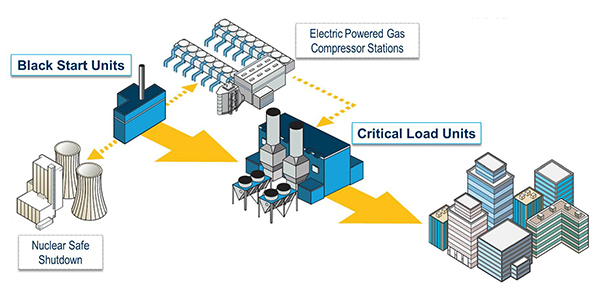PJM stakeholders rejected a compromise proposal on the controversial black start unit testing issue in a final vote at Monday’s Members Committee meeting.
In a sector-weighted vote of 3.17 (63.4%), the proposal addressing black start unit involuntary termination, substitution rules, capital recovery factor (CRF) and minimum tank suction level failed to reach the necessary 66% threshold for endorsement.
The same proposal, which was originally offered by PJM at the Operating Committee and was later presented by stakeholders at the Markets and Reliability Committee, was endorsed at February’s MRC meeting in a sector-weighted vote of 3.35 (67%). (See PJM Black Start Rules Inch Closer to Final Approval.)
The black start issue remained in limbo for a month when PJM’s alternative Option 1 proposal failed with a sector-weighted vote of 2.48 (49.6%), while Dominion Energy’s alternate proposal also failed with 2.47 (49.4%) at the January MRC meeting. Several stakeholders searched for a compromise, leading to the updated proposal that ultimately fell short of endorsement. (See “Black Start Packages Rejected,” PJM MRC/MC Briefs: Jan. 27, 2021.)
Members pointed to the CRF issue as the most contentious portion of the black start unit discussions throughout the stakeholder process, which dates back as far as 2018. Stakeholders voted to amend the issue charge at the OC in December to align with language in the problem statement after it was discovered the two documents did not match, leading to heated debates. (See Vote on PJM Black Start Compensation Deferred.)
The Independent Market Monitor’s package, which received only 7% support at the December OC meeting, called for updated CRF rates and commitment periods to apply to new and existing black start units.
Market Monitor Joe Bowring pointed out at the OC meeting that the CRF table was originally created in 2007 as part of the Reliability Pricing Model capacity market design and currently includes incorrect assumptions. Bowring said the CRF values are higher than they should be under the lower corporate tax rate from changes in the 2017 tax law, leading to overcompensation for units.
Adrien Ford of Old Dominion Electric Cooperative said she was “both pleased and not pleased” that the black start proposal failed to be endorsed on Monday. Ford said the compromise proposal’s lack of addressing the CRF table was ODEC’s reasoning for voting against it, saying the CRF has “been in error” and needs to be corrected “prospectively.”
She said there were many important issues regarding reliability concerns that the proposal addressed and should be considered by stakeholders.
“We just were not able to support it without addressing the rate error,” Ford said.
Compromise Proposal
Susan Bruce, counsel to the PJM Industrial Customer Coalition, and Sharon Midgley of Exelon, presented the compromise proposal of PJM’s original proposal. Bruce said the compromise proposal had a different “term of commitment” for black start resources — the “life of unit.”
PJM’s Option 1 had a commitment period of 20 years or greater if the unit offers more in the request-for-proposal process. The Dominion proposal had a commitment of the capital recovery period plus three years of a 5-, 10-, 15- and 20-year period based on unit age at the time it entered black start service.
Bruce said the content of the compromise proposal was largely consistent with the other proposals that had already been reviewed in the stakeholder process. She said she viewed the proposal as a true compromise and supported the measure.
“It was designed to show the opportunity for consensus-building and stakeholder process successes,” Bruce said.
Midgley echoed Bruce’s comments, saying the proposal represented a real compromise between stakeholders. She said it had “important enhancements” to black start testing and replacement rules and included an important change to the term of commitment.
“It’s been a little bit of a long and winding road to get this proposal in front of the Members Committee,” Midgley said.
Future Moves
Ford asked about PJM’s plan in light of the proposal’s failure to be endorsed.
Mike Bryson of PJM said that, from the beginning of the black start unit stakeholder process, the RTO has “been on the record” that it believed the CRF issue must go to FERC for a decision. Bryson said the next step will be a consultation with the PJM Board of Managers, “hopefully this week,” about the direction the RTO will take on black start and an update on any decisions by the board at the Market Implementation Committee meeting April 7.
Paul Sotkiewicz of E-Cubed Policy Associates asked if the PJM board will look at the CRF issue on a “forward-going basis” and not retroactive based on past comments by the RTO.
Bryson said PJM’s discussion with the board will be “representative of all our positions” up to the present, and the RTO will also bring forward the stakeholder discussions over the last few months.





